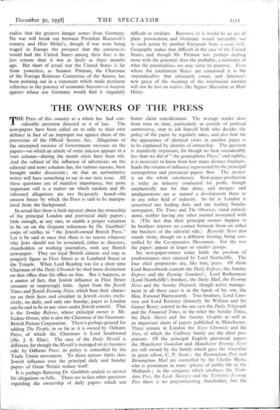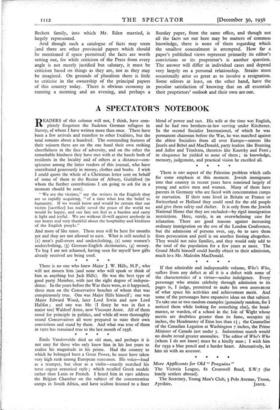THE OWNERS OF THE PRESS
.THE Press of this country as a whole has had con- siderable attention directed to it of late. The newspapers have been called on to rally to their own defence in face of an improper use against them of the provisions of the Official Secrets Act. Allegations of the attempted exercise of Government pressure on the papers—on which an article of some interest appears in a later column—during the recent crisis have been rife. And the subject of the influence of advertisers on the editorial and news columns has, for various reasons, been brought under discussion ; on that an authoritative writer will have something to say in our next issue. All these questions are of manifest importance, but more important still is a matter on which random and ill- informed allegations are too frequently heard—the unseen forces by which the Press is said to be manipu- lated from the background.
In actual fact there is little mystery about the ownership of the principal London and provincial daily papers ; little enough, at any rate, to enable a proper valuation to be set on the frequent references by Dr. Goebbels' corps of scribes to "the Jewish-owned British Press." Let it be said at once that there is no reason whatever why Jews should not be associated, either as directors, shareholders or working journalists, with any British newspaper. They are loyal British citizens and may as properly figure in Fleet Street as in Lombard Street or the Temple. When Lord Reading was for a short time Chairman of the Daily Chronicle he shed more distinction on that office than the office on him. But it happens, as a matter of fact, that Jewish influence in Fleet Street amounts to surprisingly little. Apart from the Jewish Times and Jewish Evening News, which bear their charac- ter on their faces and circulate in Jewish circles exclu- sively, no daily, and only one Sunday, paper in London can be said to be in any sense under Jewish control. That is the Sunday Referee, whose principal owner is Mr. Isidore Ostrer, who is also the Chairman of the Gaumont- British Picture Corporation. There is perhaps ground for adding The People, in so far as it is owned by Odhams Press, of which the Chairman is Lord Southwood (Mr. J. S. Elias). The case of the Daily Herald is different, for though the Herald is managed on its business side by Whams Press its policy is controlled by the Trade Union movement. To those narrow limits does Jewish influence over the principal daily and Sunday papers of Great Britain reduce itself.
It is perhaps flattering Dr. Goebbels unduly to answer his allegations so fully. There are in fact other questions regarding the ownership of daily papers which can better claim consideration. The average reader does from time to time, particularly in periods of political controversy, stop to ask himself both who decides the policy of the paper he regularly takes, and also how far the appearance of identical views in another paper is to be explained by identity of ownership. The question is manifestly important, for though we hear considerably less than we did of" the gramophone Press," and rightly, it is necessary to know from how many distinct fountain- heads the streams of influence represented by the principal metropolitan and provincial papers flow. The answer is on the whole satisfactory. Newspaper-production is today an industry conducted for profit, though emphatically not for that alone, and mergers and amalgamations are as natural a development there as in any other field of industry. So far as London is concerned one leading daily and one leading Sunday newspaper, The Times and The Observer, stand entirely alone, neither having any other journal associated with it. (The fact that their principal owners happen to be brothers imports no contact between them on either the business or the editorial side.) Reynolds News also stands alone, though on a different footing, being con- trolled by the Co-operative Movement. For the rest the papers appear in larger or smaller groups.
No newspaper-owner today holds the position of predominance once enjoyed by Lord Northcliffe. The four chief proprietors are, like him, peers. Of them Lord Beaverbrook controls the Daily Express, the Sunday Express and the Evening Standard ; Lord Rothermere (Lord Northcliffe's brother), the Daily Mail, the Evening News and the Sunday Dispatch, though active manage- ment in all these cases is in the hands of his son, the Hon. Esmond Harmsworth. Two brothers, Lord Cam- rose and Lord Kemsley (formerly Sir William and Sir Gomer Berry) control in the one case the Daily Telegraph and the Financial Times, in the other the Sunday Times, the Daily Sketch and the Sunday Graphic as well as an important chain of papers published in Manchester. There remain in London the News Chronicle and the Star, of which the Cadbury family are the chief pro- prietors. Of the principal English provincial papers the Manchester Guardian and Manchester Evening News are still owned by the family which gave the Guardian its great editor, C. P. Scott ; the Birmingham Post and Birmingham Mail are controlled by Sir Charles Hyde, who is prominent in many spheres of public life in the Midlands ; in the company which produces the York- shire Post, the Leeds Mercury and the Yorkshire Evening Post there is no preponderating shareholder, but the Beckett family, into which Mr. Eden married, is largely represented.
Arid though such a catalogue of facts may seem (and there are other provincial papers which should be mentioned if space permitted) the facts are worth setting out, for while criticism of the Press from every angle is not merely justified but salutary, it must be criticism based on things as they are, not as they may be imagined. On grounds of pluralism there is little to criticise in the ownership of the principal papers of this country today. There is obvious economy in running a morning and an evening, and perhaps a Sunday paper, from the same office, and though not all the facts set out here may be matters of common knowledge, there is none of them regarding which the smallest concealment is attempted. How far a paper's published views represent primarily its editor's convictions or its proprietor's is another question. The answer will differ in individual cases and depend very largely on a personal relationship. Strains must occasionally arise so great as to involve a resignation. Some editors at least, on the other hand, have the peculiar satisfaction of knowing that on all essentials their proprietors' outlook and their own are one.



































 Previous page
Previous page